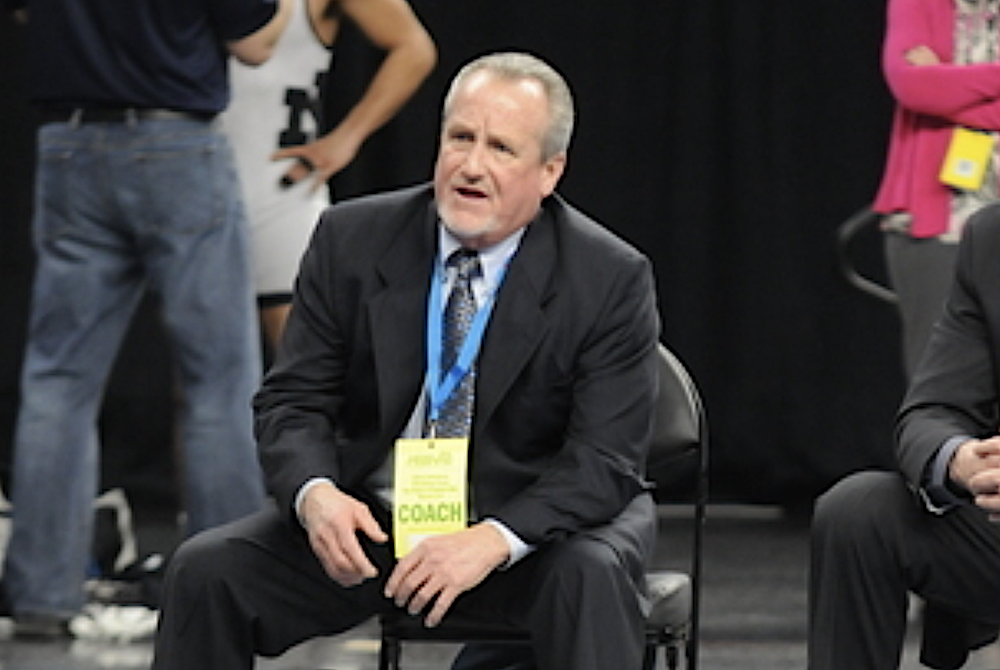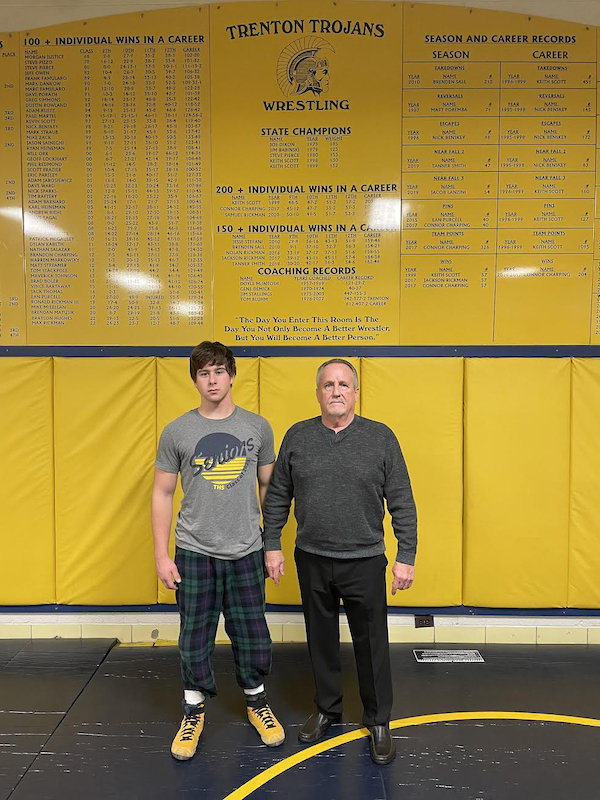
Bluhm Continues Building on Trenton Tradition in 5th Decade as Coach
By
Keith Dunlap
Special for MHSAA.com
December 22, 2022
TRENTON – What Tom Bluhm likes about wrestling also happens to correlate perfectly into what his program at Trenton has been about as of late.
 “It’s one-on-one,” Bluhm said. “You can’t hide and you can’t make excuses. That’s what I’ve always liked about it.”
“It’s one-on-one,” Bluhm said. “You can’t hide and you can’t make excuses. That’s what I’ve always liked about it.”
Excuses aren’t in the vocabulary of the Trenton program that’s been presided by Bluhm for going on 46 seasons.
Last season, the Trojans went 22-9, solid on the surface but incredible when considering Trenton had only 14 wrestlers on the team and forfeited just one weight class.
Again, Bluhm and his group weren’t interested in excuses. They just forged ahead with what they had.
“There’s no planning for it,” he said. “It’s just something that happens. It makes it tough to run practices. It’s not like you have a room of 30 or 40 guys where you can group them into three based on weight and get after it.”
Numbers haven’t traditionally been a problem for Trenton under Bluhm, who said his 1978 team had 100 wrestlers competing for spots on varsity and 50 freshmen.
In recent years, the lack of a program at the middle school level has negated opportunities to develop a feeder system, so Bluhm just hopes for the best when tryouts come around in November.
 Bluhm said it’s become an increasing scenario where athletes come out for the wrestling team who have never before wrestled in their lives.
Bluhm said it’s become an increasing scenario where athletes come out for the wrestling team who have never before wrestled in their lives.
Bluhm said one example was a sophomore who came out for the team last year, quickly learned the sport and ended up winning 36 matches.
“His mother supposedly called the AD last year saying he needed something to do because he was driving her crazy,” Bluhm said. “So he came out for wrestling.”
Nolan Diroff, a senior who primarily wrestles in the 189-pound weight class, but has also wrestled at higher weights, said the limited number of wrestlers on the team rarely comes up as a topic.
“I can’t really say that anybody has complained about not having a lot of people,” he said. “Nobody on the team complains when they get moved around in the lineup. We wrestle where Coach needs us to wrestle. We do whatever he says to try and win matches.”
Diroff said in a strange way, having a limited roster has made who is on the team better wrestlers because it has forced them to be versatile athletes who can compete at multiple weights.
“He’s kind of built us up to realize that and wrestle wherever he needs us,” he said. “He tries to get us as many matches as possible. It makes us better wrestlers and makes the team better.”
This year, there is a slight increase in the numbers.
Bluhm said there are 17 out for the team, including the first girl wrestler during his tenure.
“She fits right in,” Bluhm said. “She gets in there and does everything the boys do.”
Bluhm entered this season fourth on the MHSAA all-time coaching wins list for wrestling, carrying an 812-416-2 record with five seasons at Taylor Center before taking over at Trenton beginning with that 1977-78 winter.
Despite the struggles with numbers, Bluhm still very much gets a lot out of coaching after more than five decades.
He drives a little less than an hour to Trenton and back every day from his home in Northville, and said he’s stayed at Trenton out of his love and respect not only for the kids, but their parents.
“He tells a bunch of other stuff and random stories,” Diroff said. “Never ones that you really roll your eyes at. They are always enjoyable and shows you how long he’s been around.”
And when Trenton wrestles this season, the Trojans will do what they always do: Fight on with no excuses.
“I enjoy coaching,” Bluhm said. “I’ve always said show me some rules, and I’ll play.”
 Keith Dunlap has served in Detroit-area sports media for more than two decades, including as a sportswriter at the Oakland Press from 2001-16 primarily covering high school sports but also college and professional teams. His bylines also have appeared in USA Today, the Washington Post, the Detroit Free Press, the Houston Chronicle and the Boston Globe. He served as the administrator for the Oakland Activities Association’s website from 2017-2020. Contact him at [email protected] with story ideas for Oakland, Macomb and Wayne counties.
Keith Dunlap has served in Detroit-area sports media for more than two decades, including as a sportswriter at the Oakland Press from 2001-16 primarily covering high school sports but also college and professional teams. His bylines also have appeared in USA Today, the Washington Post, the Detroit Free Press, the Houston Chronicle and the Boston Globe. He served as the administrator for the Oakland Activities Association’s website from 2017-2020. Contact him at [email protected] with story ideas for Oakland, Macomb and Wayne counties.
PHOTOS (Top) Trenton wrestling coach Tom Bluhm coaches Connor Charping during the 2016 Individual Finals. (Middle) Bluhm and current wrestler Nolan Diroff stand in front of the program's record board. (Top photo by High School Sports Scene; middle photo courtesy of Nolan Diroff.)

Making (Health) Histories Every Year
July 23, 2015
By Rob Kaminski
MHSAA benchmarks editor
Tom Minter, recently retired from the MHSAA as assistant director, wore many hats while serving the Association and donned official’s gear in numerous sports outside of business hours.
But one of his finest refereeing efforts might have come during the 2009-10 and 2010-11 school years when he guided approximately 60 individuals representing 25 medical and professional organizations through an arduous process to upgrade the antiquated Physical Form to what is the standard today: the Pre-participation Physical Examination/Health History Form.
The form highlighted Stage 1 of the MHSAA’s 4 Hs of Health and Safety – Health Histories – and the current form is much more comprehensive, answering questions previously not asked during the quicker, more brief, evaluations.
Sudden cardiac death claims the lives of more than 300 Michigan children and young adults between the ages of 1-39 years annually. Yet, many of these deaths could be prevented through screening, detection, and treatment. One such way to detect high risk conditions that predispose to SCDY is through pre-participation sports screening of student-athletes, and the current physical form provides a mechanism.
While much more detailed, schools report that parents are more than willing to take the extra time and effort to complete the lengthier version.
“When the expanded form came out, people kiddingly made comments about its length; yet in today's day and age everyone understands we need all the information we can cultivate regarding health histories of our student athletes,” said Mark Mattson, athletic director at Traverse City Central.
Down state, feelings have been similar. “We don’t have a problem at all here,” said Anna Devitt, athletic secretary at Hartland High School. “Our parents take care of it, and haven’t balked at the length at all.”
Both agree, and are joined by many others across the state, that the next logical step is for the form to be converted to a fillable, online document so that records can be accessed by those in need via mobile, laptop or desktop.
Thus, in the “No H left behind” mantra that the MHSAA has assumed, an electronic option of the Health History form is in the early planning stages.
“As an increasing number of our schools strive to be ‘paper-free,’ or at least as much so as possible, it is time to re-invent the delivery method for perhaps our most downloaded or distributed document,” MHSAA Executive Director Jack Roberts said. “Once again, as we move forward with our ‘Heart’ initiative for the coming school year, we are also intent on bringing other projects up to speed.”
The masses are certainly enthused.
“That would be heavenly. An online version that would prevent people from submitting the forms until all the required information was in place would be fantastic,” said Mattson, who has had to turn back, or hold out students while waiting for completed forms, whether at Marquette, Maple City Glen Lake, or his current post in Traverse City. “It’s always been the same; people move too quickly and overlook required fields. It would prevent two things: one, having to hold kids out while waiting for a signature, and two, prevent parents from having to drive in to the athletic office to sign or fill in that last field. We’d know we were getting a completed form.”
At Hartland, where athletic director Jason Reck created an online emergency contact form, a system is in place which allows coaches, administrators and trainers to share necessary data for all student-athletes in addition to the MHSAA forms.
“Our parents love the online emergency contact form, and we require them to fill it out every season, not just once a year,” Devitt said. “Sometimes an athlete gets injured during one season and the next season's coach wants to know about it.”
The information on the form is populated into an Excel spreadsheet which Reck, Devitt, the school trainer and all coaches can access. They can tailor the data by sport and pull it to their mobile devices.
“We’re trying to go completely paperless, and the MHSAA physical form would be another step,” Devitt said. “Our parents and doctor’s offices would love it.”

